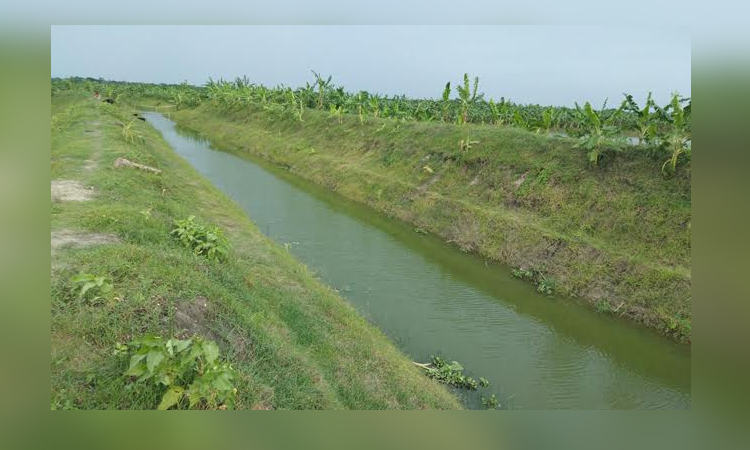News Flash
News Flash

By Md Aynal Haque
RAJSHAHI, Sept 24, 2025 (BSS) - Once a drought-prone region, Barind is now witnessing a quiet agricultural transformation, thanks to the re-excavated Sarmangla canal which has become a vital surface water source for irrigation.
For the last two decades, the canal, located in Godagari upazila, has been supplying water to crop fields under the management of the Barind Multipurpose Development Authority (BMDA). Farmers are now producing a variety of crops and vegetables almost round the year.
BMDA has integrated innovative technologies such as solar-powered irrigation pumps and managed aquifer recharge (MAR) systems to maximize the use of canal water and nearby ponds, while simultaneously replenishing groundwater levels.
Two low-lift pumps have been set up beside the Sarmangla canal at Jagpur and Birail, while two more operate near ponds in Gopalpur and Paldevpur. These systems, supported by around Tk 1 crore investment, now provide irrigation to more than 2,000 bighas of farmland annually.
In addition, 10 solar panels have been installed in Rajshahi, Naogaon and Chapainawabganj districts to expand irrigation coverage. Each of the 24-module solar systems generates 720 volts, equivalent to five horsepowers, with a capacity to discharge 300 liters of water per hour. The lifespan of the system is 20 years.
"Solar irrigation is not only cost-effective but also environmentally friendly," said BMDA Additional Chief Engineer Shamsul Huda, noting that the renewable power helps reduce carbon emissions and pressure on the national grid.
Farmers also share the benefits. Mosharraf Hossain of Birail village said, "We no longer depend on uncertain power supply. With solar irrigation, crop production has become more reliable."
Alongside canal-based irrigation, BMDA has re-excavated 38.85 kilometers of canals and constructed 16 submerged pipelines to create surface water reservoirs. Around 1.23 lakh meters of underground pipelines and at least 96 low-lift pumps have been installed to enhance irrigation efficiency.
The scale of BMDA's interventions is remarkable. In the last fiscal year (2024-25), the state agency re-excavated 122 kilometers of canals and 56 ponds, built 22 cross-dams, installed 56 solar-powered irrigation machines, and set up 450 deep-tube-wells alongside 1,305 kilometers of underground pipelines.
Since its establishment in 1987, BMDA has re-excavated 2,649 kilometers of canals, developed 4,313 ponds, constructed 800 cross-dams, installed 15,348 underground pipelines, rehabilitated 4,790 deep tube wells, produced 8,500 tonnes of seeds, and trained 1.58 lakh farmers.
Currently, BMDA operates 15,560 deep tube wells and 991 low-lift pumps, ensuring irrigation for 6.28 lakh hectares of land and producing around 70.60 lakh metric tonnes of food crops annually.
Soil scientist Dr Nurul Islam observes that BMDA's irrigation initiatives have enabled farmers to grow multiple crops annually, raising incomes and strengthening food security.
As a result, the once drought-stricken Barind is now called the "rice bowl of Bangladesh." The success of BMDA's irrigation management stands as a model of sustainable agricultural development and rural transformation.